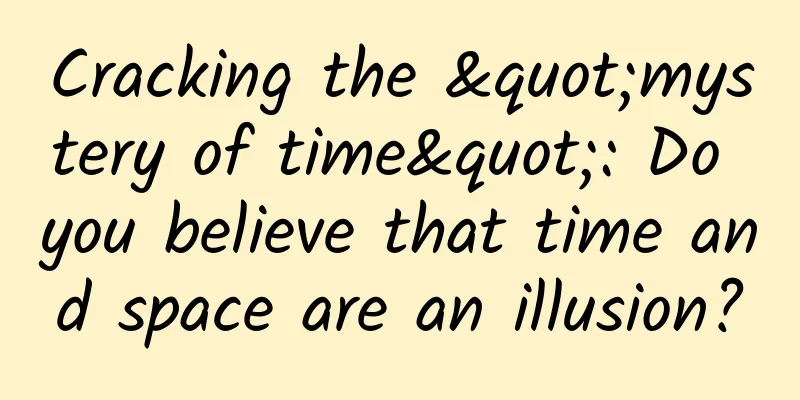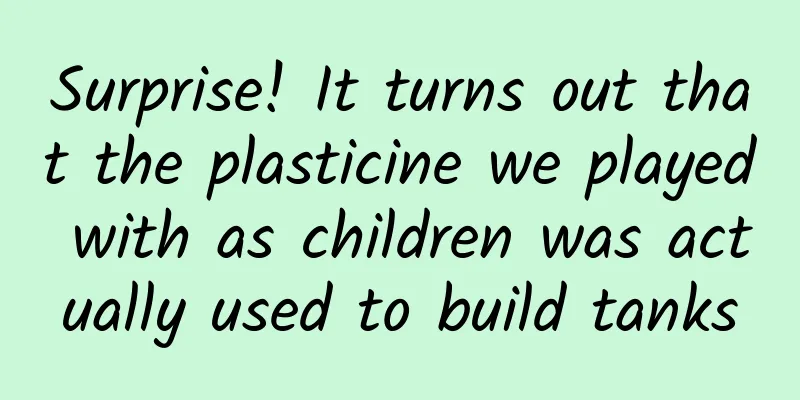Cracking the "mystery of time": Do you believe that time and space are an illusion?

|
Leviathan: According to the second law of thermodynamics, in a closed system (we can regard the universe as the largest possible closed system), entropy can only increase, not decrease. Entropy in the universe cannot decrease after increasing, so time is irreversible. Our process from birth, growth, aging, and death is irreversible, just like the process of a cup falling to the ground and breaking. I particularly like this sentence in the article, " We, a species that relies on entropy increase and is anchored in the passing of time, can only come up with this unique perspective ." This may be why it is difficult for us to imagine what a scene with " neither time nor space " would look like - when we say that time "passes", it is just an approximate statement based on the past, present and future. Of course, there are also physicists who believe that this linear "arrow of time" has nothing to do with whether time exists, but only with the direction of time movement. Does the concept of time only make sense for creatures like us with a nervous system? If there is no observer (observation), will time still be presented in the order of past-present-future? By Carlo Rovelli Translated by Zhan Guang Proofreading/Qiao Qi Original text/nautil.us/issue/64/the-unseen/the-end-of-time This article is based on the Creative Commons Agreement (BY-NC) and is published by Zhan Guang on Leviathan Or Jupiter reserved More winter, Or on the cliffs This winter of tormenting waves is the end, Be wise, filter the wine, cut off Hope is long, life is short. Speaking, jealous Time has slipped away. Take advantage of today, don't let tomorrow deceive you. —Horace, Odes, Book I, No. 11 (Translator's note: The translation is from Li Yongyi's translation of Selected Poems of Horace) "He left this strange world a little earlier than I did, but that doesn't mean anything. People like us who believe in physics know that the distinction between past, present and future is just a persistent and stubborn illusion." — Letter of condolence from Albert Einstein to the family of Michele Angelo Besso, 1955 The poem describes the passage of time in a way that we take for granted: time is simply a uniform, consistent flow across the universe, and as time passes, everything happens. There is something called the present moment that permeates everything, and that moment constitutes reality. We all have a past, which has happened, is fading, and cannot be changed. The future is open, but it is not yet settled. Reality flows from the past, through the present, and into the future—and the asymmetry of the evolution of things over time is deeply rooted. All of this is the basic structure of the world. However, this familiar picture has fallen apart, presenting only an approximation of a reality that is far more complex. There is no present moment that pervades the universe. Events are not neatly arranged in the order of past, present, and future, but only partially ordered. There is only a present moment near us, and there is no present moment in distant galaxies. The present moment is a local phenomenon, not a global phenomenon. In the fundamental equations that govern everything, there is no difference between the past and the future. The difference comes only from our distorted perception of things, which makes everything that happened in the past unique. Image source: Tumblr Time flows at different speeds everywhere, depending on where we are and how fast we are moving. The closer we are to a large mass, or the faster we are moving, the slower it flows: so there is not just one interval between two events, but millions. The rhythm of time's flow is determined by the gravitational field, a real entity with its own dynamical laws. These laws are enshrined in Einstein's equations. If quantum effects are ignored, time and space become different features of a big ball of jelly, and we are in this jelly. But this world is quantum, so jelly-like spacetime is only an approximation. In the basic grammar book of the spelling world, there is neither space nor time - only processes that transform physical quantities from one value to another, and through these processes we can calculate the probabilities of events and the relationships between them. The mystery of time always puzzles us and stirs up deep emotions in us. At the most basic level, as far as we know, there is nothing remotely resembling the "time" we experience. There is no special "time" variable that distinguishes the past from the future, nor is there spacetime. Despite this, we can still write equations that describe the world. In these equations, the variables evolve in coordination with each other. This is not a "static" world, nor is it a "block universe" where all change is an illusion: instead, our world is made up of events , not things . Image source: Gifer What is written above is a long journey that took me to a universe where time does not exist. The destination of the return voyage is clear then - how did our perception of time arise in a world without time? Surprisingly, we ourselves play a role in the emergence of time as we are familiar with it. From our tiny part of the world, everything seems to flow in the river of time. The reason we see the world in this distorted way is that we only interact with a part of it. As if that weren’t enough, quantum indeterminacy adds another twist. The indeterminacy leads to the emergence of a unique variable called “thermal time” and a measure of uncertainty called “entropy”. Image credit: NASA/GSFC Perhaps humans are a small, unique subset of the world, and in our interactions with the outside world, we perceive one end of the arrow of thermal time as always having lower entropy. Therefore, this direction of time passing is indeed real , but also subjective : the entropy of the world relative to us always increases as thermal time passes. So, we see events arranged in order along this variable, and we call this variable "time". Increased entropy allows us to distinguish between the past and the future, and guides the universe to unfold and evolve. Entropy also leaves traces, remnants, and memories of the past. We humans are the byproduct of this great history of increased entropy. Traces of the past leave us memories, and memories make human society a whole. Each of us is a unified being because we all reflect the world, and we form a unified image of the world through our interactions with our fellow beings, and this image is a perspective on the world that is unified by memory. This is where what we call the "passing" of time comes from. This is what we hear when we listen to the passing of time. Image source: Ontonix Srl "Time" is just one of countless variables that describe the world. It is one of the variables that describe the gravitational field: at our scale, quantum fluctuations play no role, so it is reasonable to think that spacetime is deterministic. So we think of spacetime as solid, like a table. This table has different dimensions: one is called space, and one is called time, which is accompanied by entropy. In daily life, the speed at which we move is insignificant compared to the speed of light, so we cannot feel the difference between the proper time of different clocks. The difference between the speed of time passing at different distances from a large mass is also too small to be distinguished. In the fundamental equations that govern everything, there is no difference between past and future. In the end, the many possible times vanish, and we can only speak of one: the time we experience—uniform, pervasive, orderly. This is an approximate approximation of an approximate description of the universe, and it is the only unique perspective we can get as a species that relies on increasing entropy and is anchored in the passing of time. As Ecclesiastes says, there is a moment when we are born and a moment when we die. Time is just that to us: a multilayered, complex concept, with multiple, distinct properties derived from a variety of different approximations. Many discussions of time are confused because they fail to recognize the complexity and multi-layered nature of time. The mistake they make is precisely that they fail to see that the multiple layers of time are actually independent and unrelated. After a lifetime of exploring it, this is what I think the physical structure of time is. There are many parts of this story that are solid and plausible, some that are plausible, and some that are pure speculation, just to try to see if I can get a glimpse of the whole picture. In any case, there is one general fact that is completely plausible: the time structure of the world is completely different from our naive imagination of it. Naive imagination is suitable for daily life, but it is not suitable for understanding the subtleties of the world and its vastness. In all likelihood, it is not even enough to understand the nature of ourselves, because the mystery of time is entangled with the mystery of our personal identity and the mystery of our consciousness. The mystery of time has always puzzled us and aroused deep emotions in us, emotions so deep and profound that they are the source of philosophy and religion. Image credit: Ignacio Serrano I believe that, as Hans Reichenbach wrote in The Direction of Time, the clearest book on the nature of time: It was to escape the anxiety-inducing nature of time that Parmenides denied its existence, Plato imagined a world of ideas that existed outside of time, and Hegel, when talking about the present, asserted that the soul transcends time because it can understand this from its own all-encompassing nature. To escape this anxiety, we imagine the existence of "eternity", a strange world outside of time, where we place gods, monotheism, or immortal souls. Our deeply emotional attitude towards time has contributed more to the construction of the edifice of philosophy than logic or reason. The opposite emotional attitude, that of Heraclitus and Bergson, which reveres time, has also given rise to many philosophies - but none of them has brought us any closer to the nature of time. It is physics that helps us pierce through the mysteries of time. It shows how the temporal structure of the universe is different from our perception. It gives us the hope of studying the nature of time clearly, without being obscured by the fog of emotion. But in our journey to pursue the nature of time, as theories rise layer by layer and get further and further away from ourselves, we may eventually find some discoveries about our own nature - just like Copernicus, who studied the movement of celestial bodies and finally realized that the earth under his feet is also moving. Perhaps, in the end, we will also find that the emotional dimension of time is not a fog that prevents us from objectively understanding the nature of time. Perhaps, our feelings towards time are exactly what time means to us, no more, no less. About the author: Carlo Rovelli is a theoretical physicist and popular science writer. This article is excerpted from his book The Order of Time. |
>>: Don’t talk about hotpot, I can’t control myself!
Recommend
Fight to the end "Fight" big screen TV version "Ximi Mahjong: Fight to the end"
Screen: Sound Effects: operate: Plot: Experience:...
There is real "magic" in physics, and it represents a class of quantum resources
There is indeed "magic" in physics, but...
With confusing positioning and monthly sales of less than 7,000 vehicles, is the Shanhai series the key answer to Jetour's transformation?
Having more children means more fighting, and thi...
This article will show you the magical ocean temperature difference power generation
The ocean is the world's largest solar collec...
Progress bar! It's actually! Fake! What's the point of it?
In 1984, Jobs, who was only 29 years old, decided...
"How Much Do You Know About Food Nutrition" Series | Sprouted Brown Rice Improves Type 2 Diabetes, Researchers Analyze the Reasons
At present, many studies have shown that eating b...
Detailed explanation of the latest process for submitting Apple iOS APPs for listing, a practical guide for novices to list on the App Store!
Let me first briefly talk about the steps of list...
Don’t rush to “take action” even if you are “inspired”. Patients with heart disease should be cautious when traveling during the short holiday.
Written by Shi Shutian (Deputy Chief Physician, D...
Magical wormholes, more than just science fiction
Many people must have heard of "wormholes&qu...
E-commerce poster design basics video tutorial
Course Description For many e-commerce designers,...
Samsung is serious! Announced the establishment of a VR content studio in the United States
According to the latest news from foreign media, ...
Apple released iPhone X and other new products. We sorted out the comments and complaints from foreigners.
This morning, Apple held its autumn new product l...
These 4 overnight dishes are too dangerous. It is best to throw them away if you can't finish them.
It is said that "thrift is a traditional vir...
6 indicators to teach you how to formulate financial supermarket operation strategies!
In this article, the author proposes five operati...
The merger of Feifan Automobile is almost certain. No matter who breaks the impasse, time is no longer on SAIC's side.
Recently, there are reports that SAIC Feifan Auto...









